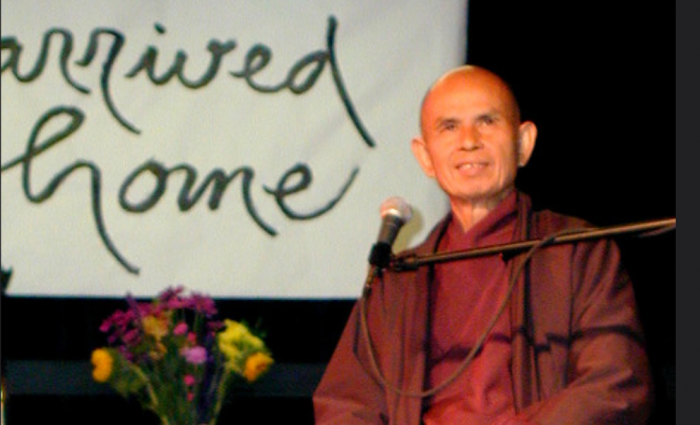Author’s note: A frank discussion of suicide and a suicide attempt is addressed below.
The bottle of pills was uncapped and empty in my hand when the paramedics arrived at my home.
I was sprawled on the bedroom carpet when they entered my room by force, wood scattered everywhere from the foot used to open the door.
All I can remember is the intense emotions coursing through my body as I swallowed an entire bottle of opiates. My emotions spilled out of me and into my wrist as it poured the bottle into my mouth. The EMTs arrived just as my body began to be covered with the warm blanket of an overdose.
This was the first time I tried to take my life.
As I watched Thich Nhat Hanh speak regarding suicide today, I couldn’t help but be hit with an Aha moment.
He brought up a story told by the Buddha regarding heavy emotion. This story states that if you are hit with an arrow, this causes extreme physical pain. If you are hit with a second arrow, in the exact same spot right after the first, your pain level elevates. Your body is no longer suffering from extreme pain, it is overcome.
When we relate this to suicide, we look at the emotional pain. If an individual is contemplating suicide, they are trying to cope with extreme emotions. These emotions can be sadness, hopelessness, or fear. These emotions, like the arrow, come one after another. Suicide is the brain’s reaction to being overcome with negative emotions.
September is National Suicide Prevention month, while September 10th is National Suicide Prevention Day. As we creep slowly into this month of awareness, I would like to share a technique that has saved me countless times from the depth of my negative emotions.
During Thich Nhat Hanh’s speech, he shares with us a Buddhist remedy for moving through these emotions. It all starts and ends with the breath.
1. As we begin to count our breathing in and out, we notice our abdomen rising. We pay close attention to the rise and fall as we count the in and out breath.
2. The noticing of the abdomen diverts our attention to the feeling in our belly. This may be anger, frustration, or disappointment. We do not ignore these emotions. We do not distract or try to push them away. Instead, we continue the counting of our breath and feel these emotions. We breathe through our feelings.
3. Once we have allowed these emotions to be felt, we can then begin to soften our abdomen. This is like a meditative body scan. Begin to focus attention on the muscles around our abdomen and breathe into them, exhaling your tension.
I want to take a moment and state that this simple technique is not meant to curb suicidal thoughts or ideation. If you are considering harming yourself, you should reach out to emergency help as soon as possible.
I have used this technique many times over the years. Breathwork in the moment of an extreme emotional breakthrough can help us bring our minds to the here and now. This can assist our minds in processing these emotions, so they do not build up inside of us.
I hope your life today is ruled by freedom and not emotion. When these emotions begin to bubble up, I hope the breath is where you turn for comfort.
Namaste.
~
“Only a free person can be a happy person. The amount of happiness that you have depends on the amount of freedom that you have in your heart. Freedom here is not political freedom. Freedom here is freedom from regret, freedom from fear, from anxiety and sorrow.” ~ Thich Nhat Hanh
~
~
AUTHOR: MEAGON NOLASCO
IMAGE: ANISSA WOOD/FLICKR


No comments:
Post a Comment